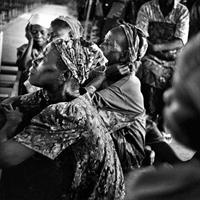DRC: Rape crisis set to worsen amid Kivu chaos

Soaring insecurity in eastern Democratic Republic of Congo has raised fears of a new wave of sexual violence in a region termed “the worst place in the world to be a woman” by aid workers.
During the first six months of 2008, there were more than 5,000 reported rape cases in the flashpoint province of North Kivu, according to data collected by doctors at health centres. The true figure is likely to be far higher, as women are too traumatised or afraid of stigma to seek help.
One hospital specialising in sexual violence in Goma, capital of North Kivu, admits on average four women a day - making more than 18,000 since it opened in 2003.
In neighbouring South Kivu, the UN reported 27,000 sexual assaults in 2006. It is impossible to say how many cases there have been across the country but based on anecdotal evidence, doctors say numbers are rising.
With the recent surge in fighting between the government army and rebels led by renegade general Laurent Nkunda, many more women - and some men - will likely have fallen victim to Congo's notorious reputation for the use of rape as a weapon of war.
“Common pattern”
"They came after it was dark when we were hiding in the house; they forced open windows and shone torches inside," one 45-year-old woman told IRIN in Rutshuru, 90km north of Goma, as she lay recovering from being raped by a man she said was a rebel soldier.
"They told us to open the door or they would break it down and kill everyone inside. What could I do?"
She was forced to the ground by two soldiers. Her husband, 52, was dragged to the floor and the muzzle of a rifle pressed to his head.
"They said they wanted money. I took one of them into the bedroom and gave them US$50, which we had borrowed from a friend so that we could run away from the fighting.
"He took that and then he raped me. He stopped halfway and went outside to tell my husband that he would be shot if he moved."
The woman, who refused to be identified for fear of reprisals, said doctors had told her she would recover. When she spoke to IRIN, two days after her attack on 30 October, she could barely move.
"This is not going to be an isolated case," said Joseph Ciza, who helps to run the HEAL Africa hospital for victims of sexual violence in Goma.
"Whenever there is fighting, there are attacks on women. Those attacks reduce when the armies are actually in battle, but once that stops and they settle into their new positions, the rapes will start. It is a common pattern."
Women have reported a surge of sexual violence in the past fortnight in Kibati, the village 12km north of Goma that lies just south of the frontline but which has been swamped by displaced people fleeing fighting.
"There are two women living in the shelter next to me who were taken as they looked for bananas in the fields," said Angelique Bendanduka, 32, in Kibati. "They are not the only ones. Many women are being attacked here by the government soldiers. The soldiers also steal food we have been given by aid workers."
Education is key
There is almost no safety for such women in the midst of conflict. Judicial systems are weak even in peace-time. Police officers can be bribed by those accused of carrying out rapes, and women fear being stigmatised.
"This has to one of the worst places in the world to be a woman," said Martin Hartberg, protection adviser in Goma for Oxfam.
"We have heard reports from every single woman in some villages that they have suffered some kind of sexual abuse in the last five years. It is as if rape has become ingrained into the culture of these armed groups, and it is very difficult to turn that tide without overall security reform in this country."
A new constitution adopted in 2006 clarified definitions of rape and sexual attacks, and introduced a 20-year minimum sentence for those found guilty.
But few women have the money to prosecute, and the judicial system is too riddled with corruption to effectively stamp out the culture of impunity. "Getting rid of the men roaming the countryside with guns is the only way to stop it," Hartberg said.
Ciza is more optimistic, however. "It is simple what has to be done - everyone must be taught that women have value and human rights," he said.
"If that happens, then militia commanders can teach it to their recruits, children will grow up knowing that rape is bad, things can change.
"But it will take a long time. We have already come so far in the wrong direction."
 Back and Next - Back and Next
Back and Next - Back and Next See Also - See Also
See Also - See Also